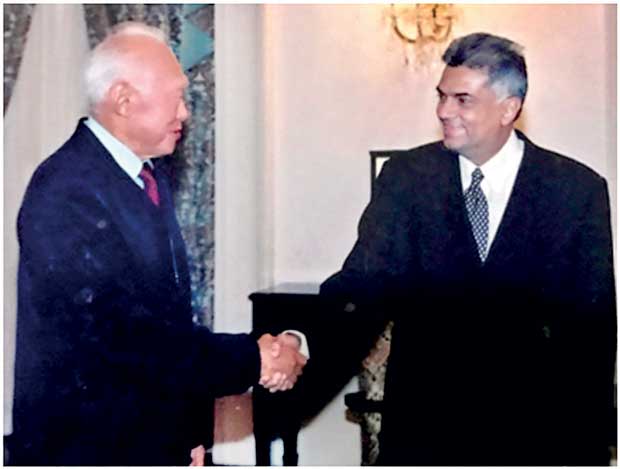18 Oct 2017 - {{hitsCtrl.values.hits}}
 Singapore’s success is largely attributed to its continuing investment in talent. Lee Kuan, the architect of this transformation is pictured with Prime Minister Ranil Wickremasinghe in 2002
Singapore’s success is largely attributed to its continuing investment in talent. Lee Kuan, the architect of this transformation is pictured with Prime Minister Ranil Wickremasinghe in 2002
 According to Ruchir Sharma, the author of ‘Rise and Fall of Nations’, there are 10 most important things to look for whether a country is rising or falling: one of them being the country’s talent pool - i.e. is the manpower pool growing?
According to Ruchir Sharma, the author of ‘Rise and Fall of Nations’, there are 10 most important things to look for whether a country is rising or falling: one of them being the country’s talent pool - i.e. is the manpower pool growing?
Annually, the World Economic Forum ranks countries in the Global Competitiveness Index — a decent gauge of which nations are best positioned to squeeze efficiency out of their businesses and to attract companies and investment from overseas.
But if you look beyond the index and examine what countries are actually doing to earn their rankings, the bigger takeaway is that the quality of workforce skills is inextricably linked to economic development.
To a great extent, Sri Lanka has yet to reach its full potential in the new knowledge-service-based economy. To do that, we must continue to recognize the importance of building upon the existing industries that offer potential for future economic growth.
Tourism, for example can create 300000 new jobs by 2020, the sector holds tremendous promise but the lack of skills and manpower would be an impediment to the growth of the industry.
Then the construction industry needs over 600,000 to do the Rs.65 billion worth of construction work by 2020. The same with the technology sector – 100,000. These sectors cannot find the people. We need to selectively open our doors to skilled labour until we build our bench strength.
The other challenge we have is if we are to succeed as an emerging economy, Sri Lanka must achieve a balance between a manufacturing-based economy and one driven by knowledge, services, ideas, information and technology. The importance of this pivotal change cannot be overstated.
As compared to other countries, our current level of competitiveness is relatively low. But the opportunities before us are limited only by our imagination and our willingness to transform our vision into reality. The task at hand therefore for our policymakers is very challenging but doable. What is required is the political will and execution.
Transforming our economy
Much of the burden of transforming our economy will fall squarely upon the shoulders of our leaders and our education system. Specifically this transformation will require our schools, colleges and universities to provide expertise, experience and leadership in these four key areas:
Workforce development, arming graduates with the knowledge necessary for today’s knowledge – service-driven economy
Strategic partnerships between higher education and industry that will lead to private sector expansion
Generation and transfer of ideas and technologies from research to commercial applications
Building communities and enhancing quality of skills to attract and retain business and industry
Our schools, colleges, universities and the workplaces have the talent, creativity but lack the expertise necessary to make a profound difference in some of the critical areas. Therefore, it is the responsibility of the government and the private sector to make sure they create the opportunities the country needs to realize its full potential.
Urgency
Sri Lanka is fortunate to have leaders both in the government and private sector who recognize the importance of investing in education. But Sri Lanka isn’t the only state in the region to realize that investment in education holds the key to economic growth.
The knowledge-based workforce development would require an innovative strategy that approaches the issues of incumbent workers, higher education as an integrated system. In keeping with their integrated approach, we need to promote market-based skills from the earliest stages. The priorities therefore should be:
Immediately identify the skills requirement to deliver the 2025 vision to enhance the skill level of the current workforce.
Support higher education programmes that will lead to more graduates with degrees in technology, engineering, sciences and hospitality programmes.
Increase the number of students prepared to enter science, services and technology fields, as well as the number of teachers who are proficient in the delivery.
Jointly identify the skills needed to support the thrust areas and develop three-year manpower plans for each sector.
Capital formation
Increasing the amount of pre-seed, seed and institutional venture capital available to emerging businesses, particularly those in the education, technology and bioscience sectors needs to be introduced. We also need to develop programmes and incentives to increase the depth of management expertise and attract Sri Lankan talent from overseas to strengthen our nation’s capability.
Conclusion
Today, Sri Lanka finds itself in a new economic climate with a new set of rules and a critical need for well-guided investment in higher education and vocational education. We now compete in a global economy that is driven by knowledge, information, ideas and technology.
The new government realizes the value of capitalizing on our existing strengths. However, as we look to the future, we must explore opportunities and ideas to become more competitive. More than ever before, building people capacity and a talent pool holds the key to our long-term economic success, a key weakness in our current disjointed education and policy framework.
Despite a reduction of unemployment rates, a skill mismatch remains between employers’ critical, in-demand skills and the availability of those skills in workers. This is certainly a threat to our competitiveness.
(Dinesh Weerakkody is a
HR thought leader)
04 Jan 2025 4 hours ago
04 Jan 2025 4 hours ago
04 Jan 2025 5 hours ago
04 Jan 2025 5 hours ago
04 Jan 2025 6 hours ago